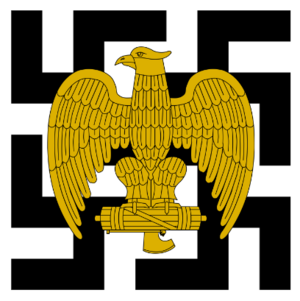Taygopol
| Taynaya Gosudarstvennaya Politsiya Тайная государственная полиция | |
 | |
| Secret police overview | |
|---|---|
| Formed | June 17, 1943 |
| Dissolved | September 3, 2021 |
| Jurisdiction | Slavic Union |
| Headquarters | ulitsa Osipova, Osipovgrad |
| Motto | "Order and Loyalty" |
| Employees | 100,000 |
| Minister responsible | |
| Parent department | Shturmovik |
The Taynaya Gosudarstvennaya Politsiya (Transl: Secret State Police), abbreviated Taygopol was the official secret police of the Slavic Union during the Vozhd era.
The force was created by Myron Matveyev in 1943 by combining the various political police agencies of the nation into one organization. The organization was heavily involved in the many crimes of the Vozhd regime and was responsible for hundreds of deaths over it's history. It was declared a criminal organization by the Vozhd Criminal Tribunal in 2022.
History
When Myron Matveyev was appointed Interior Minister and Velikymarshal of the Shturmovik he soon identified the possible usefulness of a state police force. He began meticulously looking through candidates in order to recruit a secret police, once he assembled that police force he merged it with the remnants of the Okhrana Zala as the Taynaya Gosudarstvennaya Politsiya, which was abbreviated as the Taygopol.
Matveyev appointed Miroslav Bazarov, a classmate of his at the Slavic Military Academy, as the first Politsiimarshal of the Taygopol. Bazarov was best known for his role in Noch' krovi, where he assisted in the execution of Senator Vitaly Polyakov.
After two years Matveyev, dissatisfied with Bazarov's performance, removed him from his post and took on the role of Politsiimarshal himself. Matveyev was highly selective of his personnel and many Taygopol agents were handpicked by him. Many of the Taygopol employees in the newly established offices were young and highly educated in a wide variety of academic fields and moreover, represented a new generation of Osipovist adherents, who were hard-working, efficient, and prepared to carry the Slavic state forward through the persecution of their political opponents.
After Matveyev was poisoned in 1976 Vozhd Vasily Osipov passed laws mandating that the offices of Velikymarshal and Politsiimarshal could not be occupied simultaneously, and that the Politsiimarshal was limited to 10 year terms subject to extensions by the Vozhd.